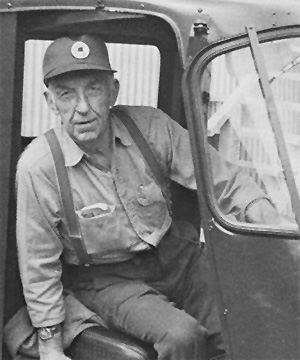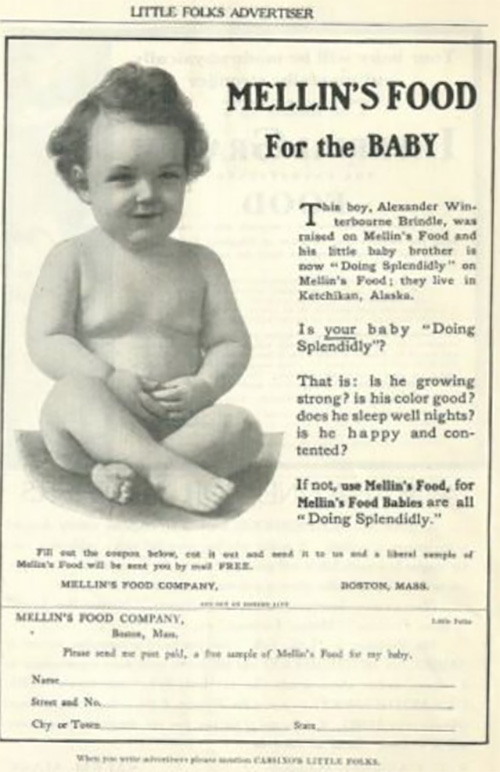Winn Brindle's national exposureLegendary Ketchikan cannery owner
|
|||||
Alexander Winterbourne Brindle |
Little Folks magazine was a national monthly magazine published in Salem, Massachusetts for children aged 3 to 12, but the advertisements in the magazine were clearly aimed at the parents of those children. Such as the one for "Mellin's Food for the Baby" that featured a smiling Alexander Winterbourne Brindle, aged 2, of Ketchikan Alaska.
"This boy, Alexander Winterbourne Brindle, was raised on Mellin's Food and his little baby brother is now "doing splendidly" on Mellin's Food; they live in Ketchikan, Alaska," the ad proclaimed.
"Doing Splendidly" was the catch phrase for Mellin's Food, which began operating in Boston in 1866 and primarily marketed a substitute for mother's milk that was a powder diluted with cow's milk and water and called a "milk modifier" that also included extract of wheat, malted barley and bicarbonate of potassium. The company marketed the product as "the only perfect substitute for Mother's Milk."
Brindle, later in life known as Winn, would grow up to become one of the leaders of the Northwest salmon canning industry.
According to his obituary by the Alaska Business Hall of Fame in 1985, Brindle "rose from humble beginnings as a mine watchman's one to establish one of Alaska's top seafood processing enterprises."
"His gruff, hard driving exterior, along with his business savvy, earned him high respect in the industry," the Hall noted. "But those closest to him all agree: His true nature was reflected by his loyalty, generosity and integrity."
A.W. "Winn" Brindle was born in Seattle 1901. His parents were Alexander and Marie Brindle. When he was still an infant, his family moved to Kasaan, where his father was a watchman at a nearby mine. In 1908, Marie Brindle insisted the family move to Ketchikan so Winn and his siblings could attend school. At that point, family members say, Winn spoke Haida more fluently than English.
As a child, Brindle showed the entrepreneurial spirit, collecting Seattle from the steamships at the Ketchikan docks and reselling them to locals who wanted news from the outside world.
Legendary Ketchikan cannery owner once appeared in baby food ad |
He also - with the help of his younger brothers - hauled coal to Ketchikan households, including those up many flights of stairs.
When his father died, Winn had to take on additional duties. Winn and his older brothers took on many odd jobs and, at one point, even purchased a vessel to haul ore from mines in the region.
The major move in his life was when he and his brother Harold purchased the Walsh-Moore Cannery in Ward Cove inn 1928. The cannery had opened in 1912 and would operate until 2003.
Renaming the cannery, Wards Cove Packing, the Brindle's would use it as a springboard to a statewide cannery empire. Although the Great Depression soon put a damper on many regional industries, salmon canning - especially the individual ones that were not tied down by large amounts of corporate debt - survived, and Wards Cove was one of the lucky ones.
Like many Ketchikan men, Brindle served in The Aleutians during World War II. He rose to the rank of major in the U.S. Army.
After the war, Brindle led his company as it expanded by consolidating with other entities in the industry. In 1948, Wards Cove Packing acquired the Red Salmon Canning Co. which dominated Bristol Bay in those days. In 1958, Wards Cove purchased the Alaska operations of Libby, McNeil and Libby, then with significant operations in Southeast, Bristol Bay and Cook Inlet. In the 1960s, Wards Cove continued to expand, adding canneries in Alitak, Port Bailey, Excursion Inlet, Haines, Hoonah and Kodiak Island.
Brindle was also at the forefront of scientific management of the industry. He helped created the Washington Fisheries Research Institute in 1946 and promoted research on Alaska salmon stocks.
Although the elimination of fish traps with the coming of Statehood in 1959 added uncertainty to the industry, Brindle plowed ahead and continued to expand, also entering into partnerships with the Columbia River Packers Association to eventually form Columbia-Wards Cove Fisheries.
Outside of the salmon canning industry, Brindle was also active. He was president of the Tongass Trading Company and was an early investor in the Baranof Hotel in Juneau. He was a director of the Miners and Merchants Bank in Ketchikan and director of the National Bank of Alaska.
He was one of the founders of the Alaska Chamber of Commerce and was awarded the "Outstanding Alaskan Award" in 1969. A scholarship was created in his honor that still sponsors students studying fishery science 60 years later.
Brindle died in July 4, 1977, and was buried in Holyrood Catholic Cemetery in Shoreline, Washington. The company he founded would continue to operate until 2002 when market and industry changes prevented the company from continuing.
By then, of course, Mellin's Food no longer existed, but by all accounts, Winn Brindle had continued to "do splendidly."
On the Web:
Columns by Dave Kiffer
Historical Feature Stories by Dave Kiffer
Dave Kiffer is a freelance
writer living in Ketchikan, Alaska. Dave Kiffer ©2021 Publication fee required. © |
SitNews ©2021
Stories In The News
Ketchikan, Alaska
Articles & photographs that appear in SitNews are protected by copyright and may not be reprinted without written permission from and payment of any required fees to the proper sources.
E-mail your news & photos to editor@sitnews.us
Photographers choosing to submit photographs for publication to SitNews are in doing so granting their permission for publication and for archiving. SitNews does not sell photographs. All requests for purchasing a photograph will be emailed to the photographer.


